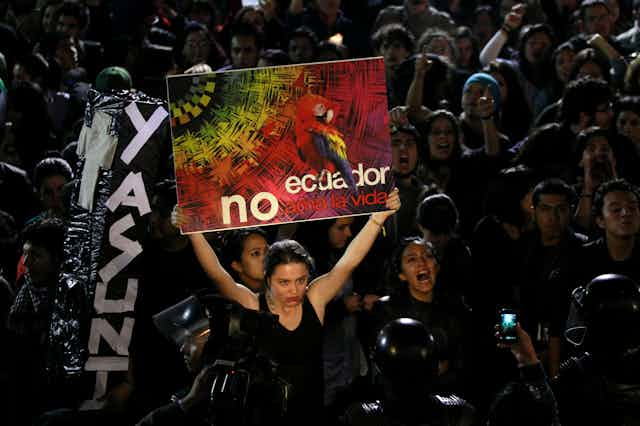One month ago, on Aug. 20, Ecuador voted to end all oil extraction in Yasuní National Park, marking a historic decision in the global effort to halt fossil fuel extraction in ecologically important regions. As climate emergencies rise globally, Ecuador has set a global precedent by protecting one of the most ecologically diverse areas on the planet, a UNESCO designated biosphere reserve.
The move is set to end any current and future extractive projects in the region — protecting over 204 different mammals, 610 types of birds and just under 20,000 human inhabitants with 200-300 Indigenous peoples living in voluntary isolation.
This referendum is a testament to the change possible through citizen political involvement. It should signal the world over the possibility for action against extractive corporate interests as well as the policies that support these interests.
Voting for our future
As we reach a critical ecological tipping point across the globe, our steps to protect the planet’s remaining ecosystem can no longer wait. The Amazon rainforest remains the world’s largest forest reserve. It filters billions of tonnes of carbon dioxide for the entire planet. A critical ecosystem service that provides us with the clean air that we breathe and helps stabilize our shared atmosphere on this planet.
The vote is set to remove any current oil projects over the next year and puts a ban on any future oil extraction in the region indefinitely. The referendum keeps an estimated US$133 billion worth of oil from the park in the ground.

The country’s nationwide referendum was the result of a petition from Indigenous groups and environmental activists within the wider advocacy of the Yasunidos Collective, a collection of activists advocating for the end to fossil fuel extraction in the Yasuní.
This comes at a pivotal moment as scientists have warned that if the world’s largest rainforest continues to shrink then it will change from lush rainforest into a savanna. Not only will this habitat be lost for millions of people, plants and animals but it will also signal the end of the Earth’s largest filtration system. The missing carbon sink and increased carbon dioxide in our atmosphere will have detrimental effects that would lead to potentially even greater unknown climatic events.
Lessons for Canada
In Canada, the people of Ontario face an opportunity for direct democracy to protect one of our country’s largest environmental assets. The Greenbelt is more than just a green space, it is a bastion of ecological services providing unseen benefits to Canadians far beyond the Toronto area.
It is also continually under threat as the Ford government seeks to finalize an $8 billion deal for developers to build housing on 3,000 hectares. This despite allegations of misconduct so serious that even the government has had no choice but to review some of the deals.
The Ontario Greenbelt is one of the most biologically rich and diverse areas in all of Canada and an area that provides protection to many both in and near its ecosystem. It does this through absorbing carbon dioxide in the atmosphere, draining water during extreme weather events and trapping heat caused by urbanization. These services protect us from climate change and, in the process, also help to prevent the worst impacts of our current global warming.
The story of Yasuní is an inspiration against the face of climate catastrophe. The United Nations says the planet has reached a climate emergency, noting that the climate science is undeniable and the result of human activities.
In Canada we have witnessed — and had to breathe in — the effects of a huge jump in the number, and severity, of wildfires. The total number of fires in 2023 exceeded Canada’s 10-year average, with an almost seven-fold jump in the total burned surface area in 2023 compared to Canada’s 10-year average.
Read more: How Canada can leave 83 per cent of its oil in the ground and build strong new economies
Against this backdrop it could be easy to forget that in Canada, we are lucky to house one-quarter of the entire world’s wetlands, temperate rainforests and boreal forests; 20 per cent of its fresh water; the longest coastline in the world; and precious habitats for birds, fish and mammals. This represents an ecological safeguard that, if nurtured and protected, will help provide a safe haven from increasing climate disaster.
That is, should we choose to begin to make the right decisions about long-term ecological wealth versus shortsighted economic prosperity.
Building on this example
The protection of the Yasuní reserve and the power of its people in Ecuador against a national government’s extractive agenda is a signal to citizens here in Canada. We do not have to be complacent with the status quo, or divided by party politics to find unity on important issues that face our reliance on this shared planet.
Direct democracy from the grassroots level can permeate to the top to mitigate climate change. The overall majority can decide whether to move forward with environmental projects that may have irreversible effects. It signifies the importance of Indigenous leaders in countering the fossil fuel industry amid environmental crisis and the power of people to change governmental policies. It is important to show how persistent resistance can make an impact.

To protect the planet for future generations to come, government agendas need to shift and be pushed by direct civil action. This means that protection of ecologically important areas should be seen as a key policy objective of national self-preservation. This is further reinforced by ever-growing calls from Indigenous leaders, academics and environmental activists demanding the conservation and restoration of natural spaces.
It is time for Canadian citizens to step up and recognize that we can make a difference in our shared commons. The importance of the precedent set in Ecuador cannot be understated. It shows that collective action can work and that we do not need to only wait for governments to do the right thing.


